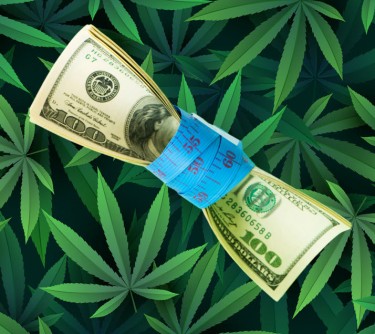
The two biggest reasons why Trump supporters have said that Trump supports legalization is that he is a businessman and will legalize cannabis and tax it at the Federal level, and that since he will not be up for re-election in 4 years, he will legalize it and not worry about the pushback. Both are terrible reasons because the US government already makes $2.5 billion a year (and growing!) by keeping the 280E tax code in place for cannabis businesses, and since he isn't running for re-election means he has no incentive to come back to the middle or please Democrats on the weed issue.
Also, taxes are the #1 killer of the legal weed industry right now, so adding a Federal tax to the consumers' bill will just push more people to the illicit and gray markets.
How bad are taxes in the weed industry you may ask?
The legalization of marijuana has ushered in a new era of cannabis consumption, transforming it from an illicit substance into a mainstream product. As states across the U.S. and countries around the world embrace this change, they are also capitalizing on the opportunity to generate significant tax revenue. However, while the legalization of marijuana has many benefits—including increased access, reduced criminalization, and economic growth—there is a hidden cost that consumers often overlook: the heavy taxation on legal weed. This article delves into the complexities of marijuana taxes, how they impact consumers, and why they may be hitting your wallet harder than you think.
The Landscape of Legal Marijuana
A Brief History of Marijuana Legalization
The journey toward marijuana legalization has been a long and winding road. In the United States, the movement gained momentum in the late 20th century, with California becoming the first state to legalize medical marijuana in 1996. Since then, more states have followed suit, with Colorado and Washington leading the way in 2012 by legalizing recreational use.
As of now, over 20 states have legalized recreational marijuana, while many others allow medical use. This shift has not only changed public perception but also created a new market that states are eager to tax.
The Economic Boom
Legalizing marijuana has proven to be an economic boon for many states. According to reports from various state governments, cannabis sales have generated billions in revenue. For instance, Colorado reported over $2 billion in sales in 2020 alone, contributing more than $387 million in tax revenue to state coffers. These funds are often earmarked for education, infrastructure, and public health programs—benefiting communities and justifying the high tax rates.
Understanding Marijuana Taxes
Types of Taxes Imposed on Cannabis
Marijuana taxes can be categorized into several types:
-
Excise Taxes: These are taxes imposed on specific goods and services. In many states where marijuana is legal, excise taxes are levied on cannabis sales at both the wholesale and retail levels. Rates can vary significantly; for example, California imposes a 15% excise tax on retail sales.
-
Sales Taxes: In addition to excise taxes, regular sales taxes also apply to cannabis purchases. This means that consumers pay both a sales tax and an excise tax on their purchases.
-
Cultivation Taxes: Some states impose taxes on cannabis cultivation based on weight or square footage. This tax is typically passed down to consumers in the form of higher prices.
-
Local Taxes: Local governments may impose their own taxes on cannabis sales, adding another layer to the overall tax burden.
Variability Across States
The structure and rates of marijuana taxes vary widely from state to state:
-
California: A combination of a 15% excise tax and local sales taxes can lead to total taxes exceeding 30%.
-
Colorado: Recreational marijuana is subject to a 15% excise tax plus a 2.9% state sales tax and local taxes that can add up to another 5%.
-
Illinois: The state has one of the highest cannabis tax rates in the nation, with recreational marijuana taxed at rates ranging from 10% to 25%, depending on the potency.
This variability creates confusion among consumers and can lead to significant price differences between states.
The Impact on Consumers
The most immediate effect of these taxes is the increased cost of legal marijuana products. Consumers may find themselves paying significantly more for legal weed compared to what they would pay for illicit products. For example:
-
A gram of cannabis that might cost $10 on the black market could cost upwards of $15 or more in a legal dispensary due to taxes.
-
For consumers who regularly purchase cannabis for medical or recreational use, these additional costs can add up quickly.
Disparities Between Medical and Recreational Use
In many states, medical marijuana patients benefit from lower tax rates compared to recreational users. This disparity raises questions about equity within the legal cannabis market:
-
Patients often rely on cannabis for therapeutic reasons and may struggle with higher prices due to taxation.
-
Some states exempt medical marijuana from certain taxes entirely or offer reduced rates, but this is not universal.
The Psychological Effect of Pricing
The psychological impact of pricing cannot be underestimated. Higher prices driven by taxes may discourage some consumers from purchasing legal cannabis altogether:
-
Consumers may revert to purchasing from illegal sources where prices are lower.
-
This undermines one of the primary goals of legalization: reducing illegal drug trade and its associated harms.
The Economic Implications
Impact on Small Businesses
While large corporations often dominate the legal cannabis market, small businesses play a crucial role as well. High taxation can create barriers for small dispensaries and growers:
-
Smaller businesses may struggle to compete with larger companies that can absorb costs more effectively.
-
High operating costs due to taxation can lead small businesses to raise prices further or limit their product offerings.
Job Creation vs. Tax Burden
Legalizing marijuana has created jobs across various sectors—from cultivation and retail to distribution and marketing. However, if consumer demand declines due to high prices caused by taxation:
-
Job growth may stagnate or decline as businesses struggle with reduced sales.
-
This could lead to layoffs or closures within the industry, counteracting some of the economic benefits associated with legalization.
The Future of Marijuana Taxation
As more states consider legalization or reevaluate their existing frameworks, there is potential for changes in how marijuana is taxed:
-
Some lawmakers are advocating for lower tax rates as a way to encourage consumer participation in the legal market.
-
Others argue that maintaining high taxes is necessary for funding public services and addressing social equity issues related to past drug enforcement practices.
The Role of Federal Legislation
Currently, marijuana remains classified as a Schedule I substance under federal law, complicating taxation at that level:
-
If federal legalization occurs, it could lead to standardized taxation across states.
-
This would simplify compliance for businesses but could also introduce new federal tax burdens.
Conclusion
The hidden costs associated with marijuana taxation are significant and multifaceted, presenting both challenges and opportunities. While these taxes generate essential revenue for public services and help regulate an emerging industry, they also impose financial burdens on consumers that can deter participation in the legal market. As legalization expands globally, it is crucial for lawmakers to find a balance between generating revenue and ensuring accessibility for all consumers. By recognizing these hidden costs, consumers can make informed decisions about their cannabis purchases and advocate for fairer tax policies that promote equity within this burgeoning industry. Ultimately, while legal cannabis offers numerous benefits—from improved public health outcomes to enhanced economic opportunities—the taxes associated with it pose a complex challenge that demands careful consideration from both policymakers and consumers. Moving forward into this new era of cannabis consumption, transparency regarding these costs will be essential in shaping a fairer and more equitable market for all stakeholders involved.
CANNABIS AND TAX BURDENS, READ ON...
THE #1 REASON CANNABIS BUSINESS FAIL? A. TAXES B. NON-PAYMENTS C. 280E?







